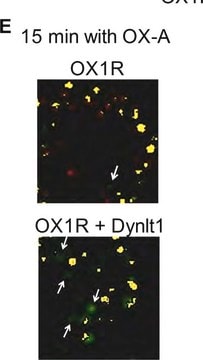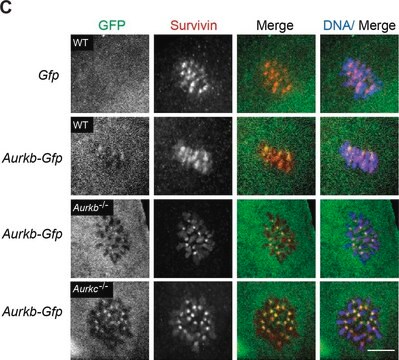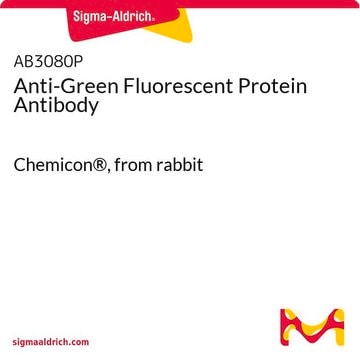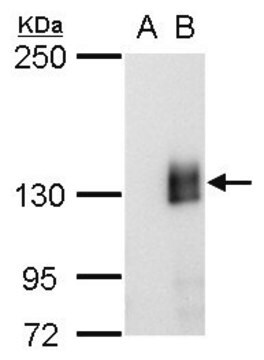AB3080
Anti-Green Fluorescent Protein Antibody
Chemicon®, from rabbit
Synonym(s):
GFP, eGFP
About This Item
ICC
IHC
WB
immunocytochemistry: suitable
immunohistochemistry: suitable
western blot: suitable
Recommended Products
biological source
rabbit
Quality Level
antibody form
affinity purified immunoglobulin
antibody product type
primary antibodies
clone
polyclonal
species reactivity
vertebrates
manufacturer/tradename
Chemicon®
technique(s)
ELISA: suitable
immunocytochemistry: suitable
immunohistochemistry: suitable
western blot: suitable
UniProt accession no.
shipped in
dry ice
target post-translational modification
unmodified
General description
Specificity
Immunogen
Application
Epitope Tags & General Use
Epitope Tags
A previous lot of this antibody was used in western blot.
ELISA:
A 1:2000-1:10,000 dilution of a previous lot was used in Enzyme-linked Immunosorbent Assay.
Note: While AB3080 has been adsorbed against E. coli proteins, most secondary antibodies have not. To reduce the likelihood of E. coli reactivity from a secondary antibody, we suggest the use of Millipore’s highly-purified secondary antibodies in indirect detection systems.
Immunocytochemistry:
Optimal working dilutions must be determined by end user.
Quality
Immunocytochemistry Analysis: Confocal fluorescent analysis of RENCX constitutively expressed GFP using this lot of anti-GFP Rabbit pAB (Red). Green indicates the expressed GFP.
Target description
Physical form
Storage and Stability
Handling Recommendations:
Upon receipt, and prior to removing the cap, centrifuge the vial and gently mix the solution. Aliquot into microcentrifuge tubes and store at -20°C. Avoid repeated freeze/thaw cycles, which may damage IgG and affect product performance.
Analysis Note
GFP fusion protein expressed in cells
RENCX cells
Other Notes
Legal Information
Disclaimer
Not finding the right product?
Try our Product Selector Tool.
recommended
Storage Class Code
12 - Non Combustible Liquids
WGK
WGK 1
Flash Point(F)
Not applicable
Flash Point(C)
Not applicable
Certificates of Analysis (COA)
Search for Certificates of Analysis (COA) by entering the products Lot/Batch Number. Lot and Batch Numbers can be found on a product’s label following the words ‘Lot’ or ‘Batch’.
Already Own This Product?
Find documentation for the products that you have recently purchased in the Document Library.
Customers Also Viewed
Our team of scientists has experience in all areas of research including Life Science, Material Science, Chemical Synthesis, Chromatography, Analytical and many others.
Contact Technical Service











